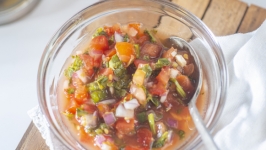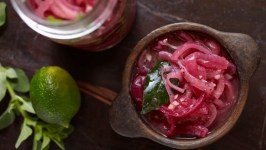Ingredients
- 970 milliliters distilled or spring water
- 30 grams unrefined sea salt
- 350 grams sliced carrots (¼-inch-thick rounds)
- 350 grams sliced white radishes (¼-inch-thick half-moons)
- 100 grams thinly sliced yellow onions
- 100 grams sliced green jalapeños (¼-i
- Kitchen scale
- ½-gallon or 2-liter wide-mouth glass jar
- Weight
- Fermentation lid
About this recipe
![]()
Recipe from The Farmhouse Culture Guide to Fermenting
By Kathryn Lucas & Shane Peterson
For native Californians, Mexican food is comfort food. At a taqueria, while waiting for our order, we belly up to the condiment bar so we can load our plates up with the spicy pickles and salsas that both add accent flavors and help cut the richness of many Mexican dishes. Modern versions are mostly preserved in vinegar, but because these ingredients are so well suited to brining we suspect that the traditional versions were likely fermented.
Depending on the season, jalapeños can vary widely in heat and flavor. Winter and spring jalapeños are milder than peak-season summer and fall peppers. Red jalapeños are the same variety but have been left on the vine a little longer. We love the jammy spiciness of red jalapeños. It’s a good idea to take a small bite of the jalapeño before you start, to gauge the spice and heat level. Much of the heat of a jalapeño is delivered through its seeds, so you can regulate how spicy your finished ferment is by including them or seeding the peppers before fermenting. Fermentation also has a slight mellowing effect, so keep this in mind as you make adjustments. You can modify the amount of jalapeño in this recipe without really affecting the integrity of the ferment.
Instructions
Wash and sanitize all your fermentation equipment, including a large bowl, knife and cutting board, and set aside to air-dry.
Make a salt brine by bringing 300 milliliters of the water to just under a boil in a small saucepan. Remove from the heat, add the salt and stir well until all the salt has dissolved. Add the remaining 670 milliliters room-temperature water to the hot brine to cool it down; set aside.
In the large bowl, combine the carrots, radishes, onions and jalapeños. Mix with your hands until well combined. Transfer the vegetables to the jar. (Alternatively, you can layer each type of veggie in the jar one by one, which produces a beautiful effect.)
Pour the kraut brine into the jar over the vegetables. Pour the salt brine into the jar, leaving about 2 inches of headspace. Reserve the extra salt brine in a small jar in the refrigerator to use as needed.
Place the weight in the jar on top of the vegetables and press down until the vegetables are completely submerged in the brine. Seal the jar with the fermentation lid. Place the sealed jar on a plate or in a bowl to catch any liquid displaced through the airlock during fermentation.
Ferment the vegetables in a cool place away from direct sunlight (3 weeks at 64°F is ideal—see the chart below). If, after the first 5 to 7 days, the level of the brine drops below the vegetables, add reserved brine as needed. Taste the vegetables after 2 weeks to determine if the flavor and sourness are to your liking. If they’re not sour enough, reseal the jar and let them ferment for another week, then taste again. When the mix is to your liking, replace the fermentation lid with a regular lid, seal and store in the refrigerator for up to 6 months.




